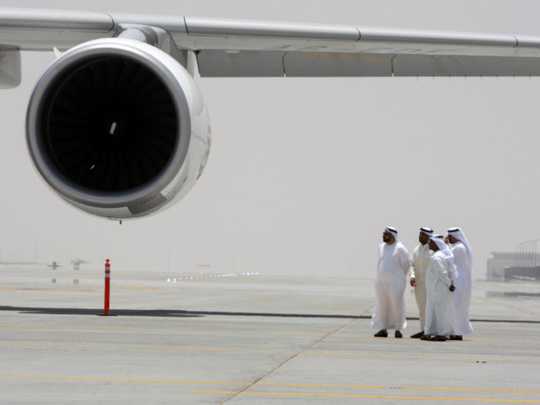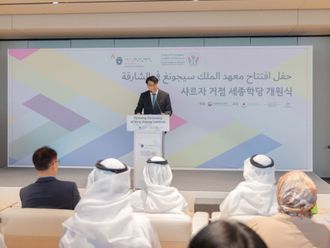
The UAE has seen critical alliances in both the public and private sector that have far-reaching effects on the future of various industries, from aviation to energy. We examine the impact of a few of these.
A new world order in aviation
Strategic partnerships: Over the last couple of months there have been headline-grabbing tie-ups, with Qantas Airways and Emirates Airline forming a ten-year alliance and Etihad Airways and Air France KLM announcing a major partnership that involves selling each other’s tickets, links frequent-flyer programmes and collaborate on procurement and maintenance.
Impact: One of the biggest positives from the Qantas deal is the Australian carrier shifting its hub for European flights from Singapore to Dubai, with Qantas operating daily Airbus A380 flights from Sydney and Melbourne to London via Dubai. Qantas flights will also link up in Dubai with Emirates connections to more than 70 other cities in Europe. The two airlines will together operate 98 flights a week between Australia and Dubai. In turn, Emirates gets excellent distribution throughout Australia.
This, along with the Etihad-Air France KLM partnership, has propelled the UAE carriers to establish themselves at the core of a new global world order, say analysts. The Etihad-Air France deal is being seen as marking a significant change in the attitude of European airlines toward Gulf carriers. This deal gives Etihad Airways the largest global reach of any Middle East airline.
Towards a sustainable future
Strategic partnerships: Torresol Energy, a joint venture between Masdar and Sener, a Spanish engineering and construction firm, last year inaugurated Gemasolar in Spain. The facility represented a significant breakthrough in the global solar industry and an important new field of cooperation between Spain and the UAE.
Earlier this year, the UAE and China signed an agreement on sustainable energy technologies and solutions. Furthermore, Scotland and Masdar also joined hands at the World Future Energy Summit.
Impact: The success of the Torresol project has positioned Masdar as a prominent player in the renewable energy field, compelling it to make investments in solar and wind energy, as they are the most relevant to the UAE. The Chinese agreement paves the way for the UAE to work closely with Chinese firms and institutions on the development and advancement of sustainable energy. Potential avenues for collaboration include joint investment in areas such as sustainable technology solutions and large/utility-scale renewable energy projects, as well as exchanging expertise and sharing experience with policies and regulatory matters.
These partnerships continue to cement Masdar’s vision of being the international hub for renewable energy and sustainable technologies, and help the capital reach its target of generating 7 per cent of its electricity from renewable sources by 2030.
Global hub of finance
Strategic partnerships: DIFC signed an agreement with TheCityUK, an independent body promoting the UK financial services industry, to share financial, legal and regulatory expertise. The UAE Ministry of Finance signed an agreement on the application of international standards with the Global Forum on Transparency and Exchange of Information for Tax Purposes. Abu Dhabi Commercial Bank (ADCB) and Banco Santander, Europe’s largest bank by market capitalisation, recently formed a partnership to provide greater services to Banco Santander’s clients in the UAE and for ADCB’s clients in overseas markets.
Impact: The UAE already accounts for £3.9 billion (Dh22.73 billion) of UK exports, and the DIFC agreement is expected to provide a significant boost to UK exports to the Middle East. This is being seen as an important gateway to the Middle East for UK firms, which will generate jobs and growth for both nations and connect the region’s emerging markets with markets around the world.
The UAE has been striving hard to promote transparency across all sectors. The Global Forum on Taxation agreement enhances the economic and political position of the UAE. Banks in the Middle East are emerging as important sources of financing for global clients, as seen in the ADCB-Banco Santander deal. This agreement paves the way for greater collaboration between the two institutions in areas such as trade and project finance, critical activities across the UAE.
Facilitating trade
Strategic partnerships: The UAE Ministry of Economy and the Department of Foreign Affairs and International Trade of Canada signed an agreement to enhance economic relations in the fields of trade, industry, services and investment. Closer to home, the UAE and India, one of the nation’s strongest trade partners, signed a free trade agreement (FTA) that will increase bilateral trade.
Impact: With its strategic position, the UAE has long been a hub for import and re-export, and is emerging as a world leader in facilitating trade. The Canadian agreement will encourage private sector growth through the exchange of information on regional and global trade in goods and services. Trade figures between India and the UAE are impressive, clocking in at $43 billion (Dh157.89 billion) in 2009-2010, making the UAE India’s largest trade partner. The FTA will help the UAE attract more Indian investment, especially to grow the manufacturing sector, thus expanding the UAE’s industrialisation.
Shoring up its defence
Strategic partnerships: The UK and the UAE announced a formal defence and industrial partnership. In an effort to increase its military might, the UAE is acquiring Lockheed Martin Corp missile defence systems to counter perceived threats in the region and to lower its dependence on US forces.
Impact: The military alliance will establish a partnership that involves close collaboration around Typhoon fighter jets and a number of new technologies. The agreement will also see the two countries increase their joint military exercises and training. This will help the UAE replace its ageing French Mirages. The UAE has ordered a Terminal High Altitude Area Defence (Thaad) missile system worth $1.96 billion and has requested an additional 48 Thaad missiles, nine launchers and other equipment valued at $1.135 billion, according to the US Defense Security Cooperation Agency.
These acquisitions will strengthen the UAE’s position as the largest importer of arms in the Middle East over the past five years.












